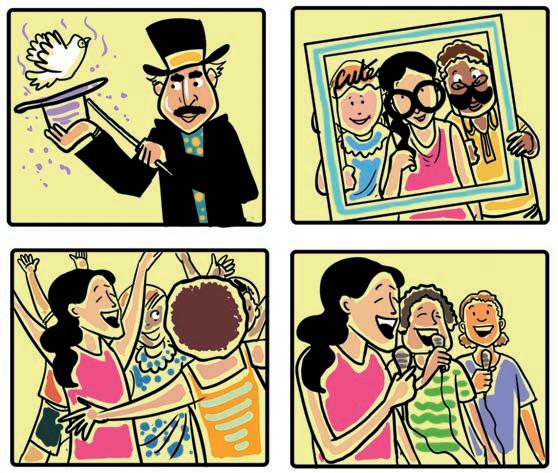libreEN MI TIEMPO

¡Me encanta la patineta!
Talk about weekend activities
Say what activities I like and don’t like
Use me gusta + infinitive

1 Escucha y mira las actividades. Escribe las letras. (1–10)


1 a 125





Listen and look at the activities. Write the letters.

Elena ¡Me encanta escuchar música!
¿Qué te gusta hacer los fines de semana?
Dante el perro ¡Me encanta pasear!

Raúl ¡Me gusta hablar por teléfono!
Nacho
Me gusta navegar por Internet.


Ben

María José ¡Me encanta jugar videojuegos!

125
Pablo Me gusta mucho leer.
Felicia
¡Me gusta mucho charlar!
2 Escucha otra vez y escribe más detalles.

Listen again and write more details.
1 listens to music – Saturday mornings



ciento cincuenta y cuatro
Gramática
¡Me encanta salir con mis amigos!
Sergio ¡Me gusta mucho tocar la guitarra!

Matilda
¡Me encanta andar en patineta!

To say you like or don’t like to do something, use the correct form of gustar + infinitive





Me gusta escuchar música. I like to listen to music. No me gusta pasear. I don’t like to go for walks.

Note that the form used is always gusta when it is followed by a verb (never gustan).
encantar behaves in the same way.
Me encanta salir con mis amigos. I like to go out with my friends.


a b b c b
e
b
f g b h b i b j
154
tltit!
3 Escribe las frases con las opiniones. Write sentences with the opinions.








1 No, no me gusta tocar la guitarra.
1 ¿Tocas la guitarra?
2 ¿Lees?
3 ¿Juegas videojuegos?
4 ¿Andas en patineta?
5 ¿Charlas con tus compañeros?
6 ¿Sales con tus amigos?
4 ¿Qué te gusta hacer los fines de semana? Habla con tu compañero/a. What do you like doing at the weekend? Talk to your partner.
¿Qué te gusta hacer en tu tiempo libre?
Los sábados, me gusta ir de compras con mis amigas.
5 Escucha. ¿Qué les gusta hacer? Copia el cuadro y escribe los detalles. Listen. What do they like doing? Copy the table and write the details.
me encanta
me gusta no me gusta
Este fin de semana
Matilde reading
Raúl
Elena
6 Trabaja en grupo. ¿Qué tienes ganas de hacer este fin de semana?
Work in groups. What do you feel like doing at the weekend?
¿Qué tienes ganas de hacer el fin de semana?
Tengo ganas de tomar fotos.
María tiene ganas de tomar fotos.
Gramática
tengo ganas de is followed by the infinitive.




¿Tienes ganas de salir con nosostros?
Do you feel like going out with us?
ciento cincuenta y cinco
126
155 ¡Me
6.1
encanta la patineta!
encanta la patineta!
7 ¿Cómo se dice en español? Lee el texto y busca las frases.
How do you say it in Spanish? Read the text and find the phrases.
1 going shopping
2 going cycling
3 going to the sports centre
4 going to the cinema
Durante la semana, estudio mucho porque quiero sacar buenas notas. Los fines de semana, me encanta escuchar música en mi dormitorio. Es muy relajante. Los sábados me gusta ir de compras con mis amigos. También nos encanta ir al cine.¡Es genial! A mi hermano le encanta jugar videojuegos, pero a mí no me gusta nada. Él dice que es emocionante y divertido, pero en mi opinión es horrible y muy aburrido. También le gusta montar en bici o ir al polideportivo, pero a mí no.
8 Lee el texto otra vez. Cierra el libro. Escribe qué le gusta y no le gusta hacer a Natalia.
Read the text again. Close your book. Write what Natalia likes and doesn’t like doing.
She likes listening to music, …

She doesn’t like …
9 Corrige las frases. Correct the sentences.
1 estudiar escuchar música
1 Los fines de semana, a Natalia le gusta estudiar.
2 Para Natalia, escuchar música es emocionante.
3 Le gusta salir con su hermano.
4 A Natalia y sus amigos les gusta ir al cine.
5 El hermano de Natalia dice que jugar videojuegos es aburrido.
6 A Natalia le gusta ir al polideportivo.
10 Empareja.
Match.
1 e
1 ¿Te gusta la música pop?
2 Me gusta
3 A Carla y a mí
4 A Salvador
5 A mis primos
6 ¿Les gusta pasear?
11 Habla con tus compañeros. Talk to your classmates.
a le gusta tocar el piano.
b nos gusta andar en patineta.
c No, no les gusta nada.
d les gusta leer.
e Sí, me encanta.
f ir al polideportivo.
¿Qué te gusta hacer los sábados, Alba? Me gusta leer.
ciento cincuenta y seis
A Alba le gusta leer los sábados.
Gramática
When gusta/encanta is followed by a verb, the verb is in the infinitive form. Note how the pronoun changes for different people. Me gusta andar en patineta. I like to skateboard.
¿Te gusta tocar la guitarra?
Do you like to play the guitar?
No nos gusta hablar por teléfono.
We don’t like to speak on the phone.
Les encanta pasear. They love to go for a walk.
¡Nota!
When a noun is included, a is used before it.
A Mario le gusta salir. Mario likes to go out.
Natalia
156 ¡Me
6.1
12 Lee el texto de la Actividad 7 otra vez y busca los adjetivos. ¿Cómo se dicen en inglés? Read the text in Activity 7 again and find the adjectives. How do you say them in English? bueno – good
13 Habla con tu compañero/a. Talk to your partner.
¿Te gusta ir al cine?

Sí, me gusta ir al cine porque es emocionante. ¿Y a ti?
No, no me gusta ir al cine. No me interesa.
¡Nota!
What do you notice about the verb interesar here? How do you think you say ‘Are you interested?’
Remember to use conjunctions like porque to make your Spanish more interesting.
14 Escucha. Lee las frases y escribe V (verdadero) o F (falso). Listen. Read the sentences and write V (true) or F (false).



1 At the weekend Andrés likes to talk on the phone with his friends.
2 He goes to the park near his house.
3 Andrés and his friends love riding a bike because it is exciting.

4 They go to the BMX track every Sunday.
5 Andrés also really likes to play the guitar.
6 He loves shopping and thinks it is fun.
15 Escribe un blog sobre qué te gusta hacer con tus amigos. Write a blog about what you like to do with your friends. El fin de semana …
me gusta le/les encanta tenemos ganas de
ciento cincuenta y siete
1 F
127
157 ¡Me encanta la patineta! 6.1
¿Quieres ir al café? 6.2
1 Escucha y mira. Escribe las letras. (1–6)
Listen and look. Write the letters.
¿Qué quieres hacer esta tarde?
2 Escucha otra vez. Escribe la forma de querer que usa cada persona.



Listen again. Write the form of querer used by each person.
1 quieres, …
3 Escribe cada frase en orden. Traduce las frases. Write each sentence correctly. Translate the sentences.
1 voleibol Quiero al jugar.
2 al Quieres polideportivo ir ¿?

3 comprar negro gato Queremos un y blanco.
4 salir Quiero mis amigos con.
5 quiere jugar Felipe al no tenis.
6 restaurante ir padres Mis italiano quieren al.
4 Habla con tu compañero/a.
Talk to your partner.
mi familia y yo yo mi mejor amigo/amiga
¿Qué quieres hacer el domingo por la tarde?

Mi familia y yo queremos ir a un restaurante colombiano.

querer (to want) is a stem-changing verb. It has regular –er endings. quiero I want quieres you want quiere he/she wants queremos we want quieren you (plural)/ they want

It can be followed by a noun or a verb. The verb is in the infinitive form. Quiero una soda. I want a soft drink. Quiere jugar al fútbol He wants to play football.


ciento cincuenta y ocho
1 f 128 a b c
128
d e f 158
Gramática
Suggest
arrangements to go out
querer + infinitive
going out Make
Use
5 Escucha la conversación. ¿Qué actividades quieren hacer el sábado? Escribe. Listen to the conversation. What activities do they want to do on Saturday? Write. play basketball, …


6 Escribe las palabras que faltan. Write the missing words.
gusta hola hacer polideportivo jugar hasta vale también
1 Hola
¡Hola, Mari! Soy Lola. (1) ¡_______, Lola!
¿Quieres ir al (2) ____________ el sábado por la mañana?
¡Sí! ¿Qué quieres (3) ___________?
Pues, a mí me (4) __________ la natación.
¡A mí (5) _____________!
Está bien. Después, ¿quieres (6) ______ al tenis?
(7) _________.
Pues, (8) _________ el sábado.
Muy bien. Adiós.
7 Lee el correo electrónico. Busca las frases en español. Read the email. Find the phrases in Spanish.

1 conmigo
Para: Irene@…










Asunto: ¿Quieres ir al cine conmigo?
Hola, Irene
¿Cómo estás? ¿Quieres ir al cine conmigo? Quiero ver la nueva película de Jennifer Lawrence. Dicen todos que es muy buena. Empieza a las seis y media pero antes podemos ir a comer una hamburguesa. Llámame si quieres ir y nos encontramos en la plaza.
Hasta el sábado.
Besos
Héctor
1 with me
2 the new film
3 Everyone says it’s very good.
4 before
5 call me if you want to go
6 we’ll meet in the square
7 See you on Saturday.
8 kisses
8 Escribe una respuesta al correo electrónico de Héctor de la Actividad 7.
Write a reply to Hector’s email in Activity 7.
Different ways of ending an email to a friend:
Saludos
Besos Un abrazo
ciento cincuenta y nueve
129
159
¿Quieres ir al café? 6.2
9 Lee la conversación. Contesta las preguntas. Read the conversation. Answer the questions.

Different ways of agreeing/saying OK: Bueno. De acuerdo. Me parece bien. Vale.
1 What are Guille and Alba going to do?
2 When?
3 Where are they meeting?
10 Pon la conversación en el orden correcto. Put the conversation in the correct order.

8, …
1 Me encanta ir de compras.
2 El sábado por la mañana.
3 Sí, claro. ¿Cuándo?
4 Está bien. ¿Dónde nos encontramos?
5 De acuerdo.
6 ¿En el centro comercial?
7 ¡A mí también!
8 ¿Quieres ir de compras?
Find examples of the verb parecer in the dialogue.






Can you use these to work out how to say: What does he think? We think it’s good.
11 Trabaja con tu compañero/a. Escribe una conversación. Incluye: Work with a friend. Write a conversation. Include: querer to suggest activities the time and where to meet
something you disagree about appropriate sign-offs
12 Elige una actividad. Haz las preguntas y busca un compañero/a para cada actividad. Choose an activity. Ask the questions and find a classmate for each activity.
ciento sesenta
ir al café escuchar música rock ir a la pista de patinaje montar en bici jugar al fútbol
fútbol?
al fútbol.
ir al café? Sí, vamos al café!
¿Quieres jugar al
No, no quiero jugar
¿Quieres
160 ¿Quieres
6.2
ir al café?
13 Lee y contesta las preguntas. Read and answer the questions.
¿Sí?
¡Hola, Luz!
Ah, hola Pepe. ¿Qué tal?
Bien gracias. Oye, ¿quieres ir al polideportivo?
Sí, buena idea. Tengo ganas de hacer un poco de ejercicio. Bueno, yo quiero jugar al voleibol. Hay un equipo que juega allí.
Vale. Está bien. Puedo ir al gimnasio antes y después jugar al voleibol con ustedes. ¿Qué te parece?
Me parece bien. ¿Nos encontramos en la pista de voleibol? De acuerdo. ¿A qué hora?
¿A las tres?
Pues muy bien. Hasta las tres. Y si quieres, después podemos beber una soda en el café.
¡Genial!
1 Where does Pepe suggest they go?
2 What does Luz want to do?
3 What does Pepe want to do?
4 Where are they going to meet?
5 When are they going to meet?
6 What does Luz suggest they do afterwards?
14 Escucha. ¿Qué información quiere la chica de la llamada?
Listen. What information does the girl making the call want?
15 Escucha otra vez y escribe los detalles. Listen again and note the details. San Pedro Cinema, …



16 Quieres ir a karts con tus amigos. Escribe una lista de lo que tienes que organizar para un día divertido.
You want to go go-karting with your friends. Write a list of the things you have to organise for a fun day out.
12:00 PM Tengo que …












llamar a la pista
17 Túrnate con tu compañero/a. Llama a la pista de karts para pedir información. Take turns with your partner. Call the go-karting track to ask for information.
¡Karts Súper, Buenos días! Buenos días. Quiero información para ir a karts con unos amigos.

ciento sesenta y uno
–
–
NOTAS 130 130
preguntar …
161
¿Quieres ir al café? 6.2
6.4
¡Felicidades!
1 Escucha y mira. Escribe las letras. (1–8)
Listen and look. Write the letters.
1 f



Say what you do at celebrations
Talk about celebrations in my life
Identify when celebrations take place
2 Empareja.
Match.
1 g
1 una fotocabina
2 tener una piñata
3 hacer una piyamada
4 jugar charadas
5 con un mago
6 hacer karaoke

7 ir a un restaurante chino

8 bailar
3 Trabaja en grupo. Describe la fiesta. Work in groups. Describe the party.

a to do karaoke
b to play charades

c with a magician

d to dance
e to have a sleepover

f to go to a Chinese restaurant
g a photo booth

h to have a piñata

¡Nota!
Look back at 2.4 on pages 46–49 to help you with vocabulary.

ciento sesenta y seis
135
b c
a
d e f g h
166
Para mi cumpleaños, hacemos una fiesta …







































































































